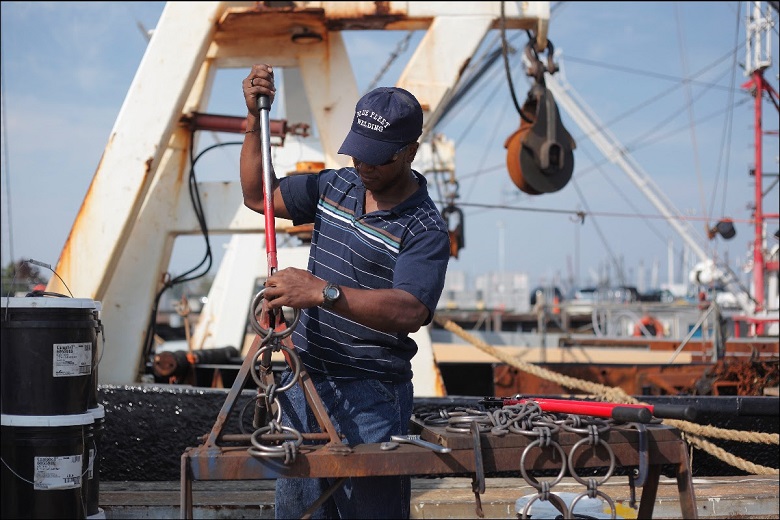 New Bedford Port Authority/A worker tends to scallop gear in New Bedford Harbor. The Atlantic scallop industry is the most economically valuable wild-caught federal fishery in the highest value fishing port in the nation.
New Bedford Port Authority/A worker tends to scallop gear in New Bedford Harbor. The Atlantic scallop industry is the most economically valuable wild-caught federal fishery in the highest value fishing port in the nation.
WASHINGTON, D.C. - After the Bureau of Ocean Energy Management announced Wednesday that it will conduct a wind lease auction for 480,000 acres of ocean in the New York Bight area of the Atlantic, the Fisheries Survival Fund, which represents the vast majority of full-time Atlantic sea scallop fishermen, called on federal regulators to create an adaptive and proactive mitigation plan that will allow both fisheries and offshore wind to prosper.
It is unquestionable that the proliferation of new turbine arrays will have detrimental impacts on the scallop fishery and other fisheries, FSF wrote. Windfarms will and demonstrably do change ocean ecosystems. The goal of mitigation should be to strike a balance that ensures mutual prosperity, not merely an uneasy, zero-sum coexistence.
The Atlantic sea scallop fishery is the most valuable federally managed wild caught fishery in the United States, worth $570 million in ex-vessel value and $746 million in total processed value in 2019. FSF's comments were sent to BOEM in response to a request for information on offshore wind fisheries mitigation.
Across 15 pages of detailed recommendations, FSF called on BOEM to take a long-term, flexible approach to reducing impacts to scallops, which are extremely sensitive to changes in the ocean environment. This approach should ensure cohesive and meaningful coordination between fishing communities, developers, state agencies, and federal regulators.
BOEM should also identify high-risk areas to be protected and require baseline surveys to be conducted immediately.
While FSF supports a comprehensive compensation plan that addresses direct and indirect losses to scallop fishermen, the top priority should be avoiding and mitigating such losses from the outset.
FSF wrote that BOEM should ensure that the fishing community and the fisheries technical community are able to work collaboratively with wind developers.
They urged BOEM to work with the fishery management councils' technical plan development teams that are experts in conservation and management of the specific fisheries resources under their jurisdiction.
They noted that facilitated workshops may be useful if they are interactive and not simply listening sessions, and expressed concern that developers conducting mere desktop exercises to simply check a NEPA box are neither sufficient to mitigate impacts comprehensively nor to compensate fisheries fully and accurately.
The comments also detail the scallop industry's proactive approach to research and management that has taken scallops from a low point in the 1990s to one of the most lucrative fisheries in the country today. FSF called on offshore wind developers to support scallop research through research grants and access and logistical support for marine scientists.
Just as scallop fishermen made sacrifices to mitigate their negative impacts on the fishery years ago, FSF's proposed strategy here may require sacrifices on the part of [offshore wind] developers that want to operate, and will change the ecosystems, in the ocean commons, FSF wrote.
Read FSF's full comments on offshore wind fisheries mitigation here.
Sign up for our Daily News Updates from Saving Seafood.
Copyright © 2021 Stove Boat LLC, All rights reserved.
Saving Seafood | 202-595-1212 | savingseafood.org